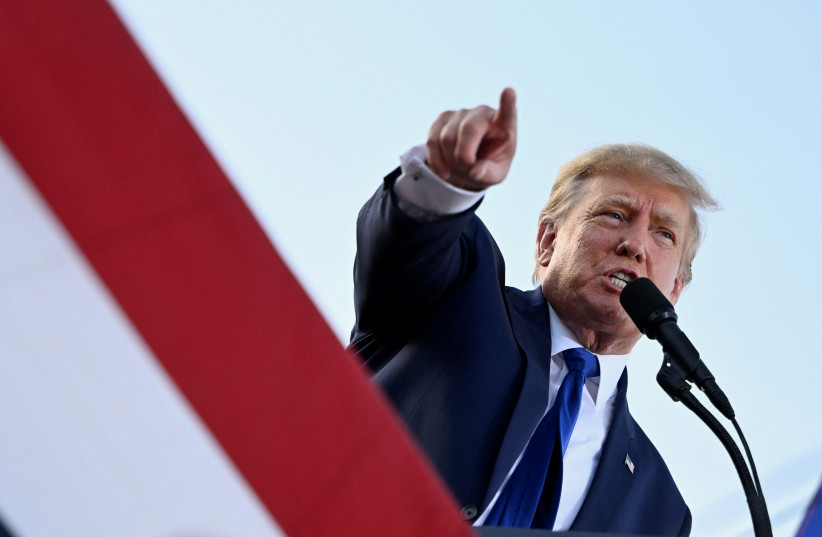Given his self-made cataclysmic arena, it is not surprising that less than two weeks after the Zionist Organization of America (ZOA) honored Donald Trump as the best friend Israel ever had in the White House, the former president casually dined at Mar-A-Lago with two of the nation’s leading celebrity Jew-haters, Kanye West and Nick Fuentes.
How was it possible for the ZOA to have bestowed its main award on Trump, and for him to have broken bread so soon with these two antisemites?
If any one word underscores Trump’s self-identity, it is victim. He sees himself as victimized by a stolen election, by fake media and now by an ungrateful American Jewish community.
Running against Joe Biden in 2020, Trump drew a paltry 21% of the Jewish vote, compared with 77% for Biden. True, Jewish voting patterns are still overwhelmingly Democratic but as Trump sees it, how could Jews have been so misguided as not to reward his great contributions to Israel’s well-being: ending the dangerous Iran nuclear deal (most Jews in Congress went along with president Barak Obama in supporting the agreement, despite prime minister Benjamin Netanyahu’s strong opposition), moving the American embassy to Jerusalem, backing Israel’s annexation of the Golan Heights and ending American financial aid to the PLO?

How to explain the dichotomy between American Jewish political behavior and Israel’s best interests according to Trump?
A series of quotes explain his disappointment:
“The Jewish people in the United States either don’t like Israel or care about Israel.”
“Jews in this country have to get their act together and appreciate Israel before it is too late.”
“There’s people in this country that are Jews who no longer love Israel.”
“The evangelical Christians in this country love Israel more than Jews in this country.”
THUS, TRUMP’S respect for American Jewish political sagacity is measured by Jewish political support for him, the fearless champion of Israel. Somehow, along the way, however, Trump never learned that the American Jewish community of the 2020s was not the same as the Jewish community of his father, Fred, two generations ago. Today’s American Jew is far more secular and assimilated than in Trump’s childhood in Bayside, Queens.
At a time of declining Holocaust memory, America’s relations with Israel do not rank among the first few issues motivating American voters. A compelling fact showing growing Jewish disinclination with Israel is that in recent years, more American Jews have visited Hawaii than Israel.
In Trump’s case, in his New York City real estate industry – mainly a Jewish enterprise – some of the main figures he associated with, such as ambassador David Friedman and adviser Jason Greenblatt, were Orthodox, committed Jews, possibly skewing Trump’s impression of positive Jewish identity with Israel.
Alarm bells should have sounded either in Trump’s head or those of his staff when it became known that the two Jew haters mentioned above arrived for dinner. Instead of escorting the pair to a local diner, they ate comfortably with the former president, who defended the gathering as a chance to provide a troubled West with valuable advice.
Arguably, the Jewish proclivity for universal social issues, such as clean air or abortion rights, rather than Jewish survival and security, set in process Trump’s idea that Jews would fail to condemn the interlude. Despite Trump’s misguided thinking, he was overwhelmingly condemned in all Jewish quarters.
Among Trump’s heroes are leaders who show strength rather than indecision. Over the years, the former president has drawn criticism for praising Russia’s President Vladimir Putin for that quality. Similarly, he respects Netanyahu for risking his premiership in confronting Obama before a session of Congress over the Iran nuclear deal. Trump boasts that given his strong leadership, were he to be an Israeli political candidate, he would win the prime ministership in contrast with supplicant rivals.
Whether or not Trump is renominated or returns to the White House, he sees a dichotomy between an acquiescent, ungrateful American Jewry and a personally appreciative public in Israel.
The writer is a professor emeritus of political science at City University of New York (CUNY) and author most recently of Strangers and Natives, a Newspaper Narrative of Early Jewish America.
